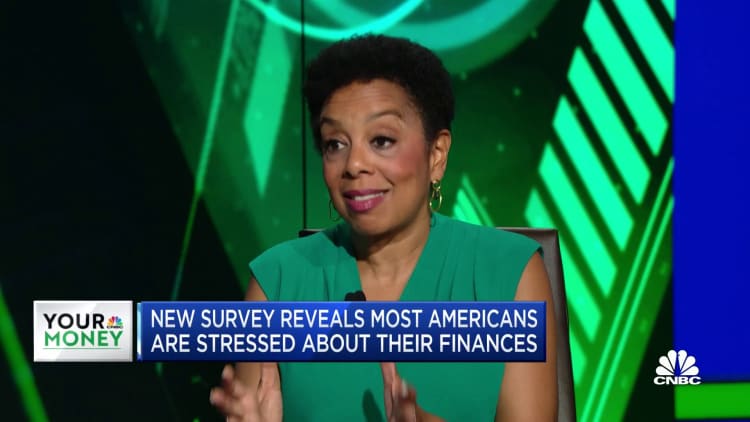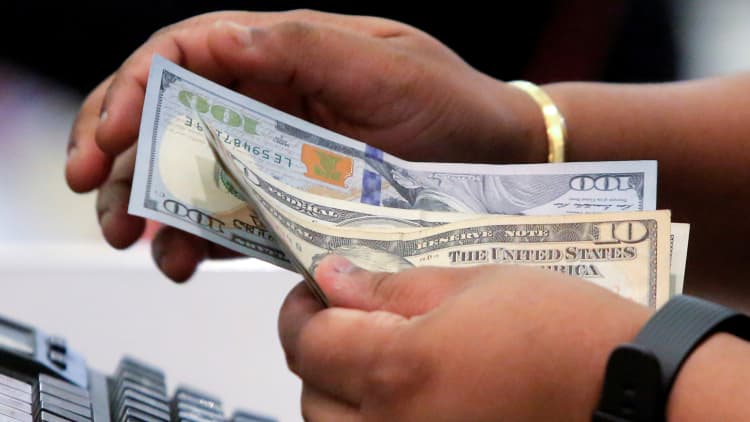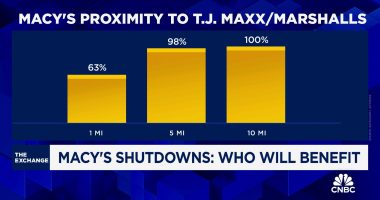Fotostorm | E+ | Getty Images
Millions of American workers are paying for early access to their paychecks. In some cases, it can come with a steep price.
So-called “earned wage access” programs, which operate either directly to the consumer or through employers, let workers tap a portion of their wages before payday, often for a fee. The services have ballooned in popularity.
While there can be various benefits for consumers — like quick access to funds in the event of an emergency — some services share characteristics of high-cost debt such as payday loans that can cause financial harm, according to some experts and consumer advocates.
“When used properly … it’s great,” said Marshall Lux, a banking and technology expert and former senior fellow at Harvard University.
However, Lux said overuse by consumers and high fees that can translate to interest rates up to roughly 400% can turn the services into “payday lending on steroids,” especially since the industry has grown so quickly.
Earned wage access has gotten more popular
Earned wage access goes by various names: daily pay, instant pay, accrued wage access, same-day pay and on-demand pay, for example.
The programs fall into two general camps: business-to-business models offered through an employer and direct-to-consumer versions.
The B2B model uses employers’ payroll and time-sheet records to track the users’ accrued earnings. When payday arrives, the employee receives the portion of pay that hasn’t been tapped early.
Third-party apps are similar but instead issue funds based on estimated or historical earnings and then automatically debit a user’s bank account on payday, experts said.
More from Personal Finance:
Many Americans can’t pay an unexpected $1,000 expense
Why the ‘last mile’ of the inflation fight may be hard
Paying rent usually won’t boost your credit score
Such programs aren’t new.
Fintech companies debuted the earliest iterations more than 15 years ago. But business has boomed in recent years, accelerated by household financial burdens imposed by the Covid-19 pandemic and high inflation, experts said.
In the employer-sponsored market, $9.5 billion in wages was accessed early during 2020, triple the $3.2 billion in 2018, according to the latest data from Datos Insights, a consultancy firm. The number of transactions also increased threefold over that period, to 55.8 million transactions from 18.6 million, it found.

Branch, DailyPay and Payactiv are among the “most significant” B2B companies, according to a recent paper published by the Harvard Kennedy School and co-authored by Lux and research assistant Cherie Chung.
There are fewer players in the direct-to-consumer market, but the most popular apps “have increasingly large and prominent userbases,” the Harvard paper said. For example, three companies, Dave, EarnIn and Brigit, report a “highly significant” user base of about 14 million combined, it said. MoneyLion is another market leader, according to Datos Insights.
‘It’s another version of payday loans’
Big companies such as Dollar Tree, Kroger, Hilton, McDonald’s, Target, Uber and Walmart now also offer employees early access to paychecks.
Companies in the B2B market often tout themselves as a win-win for employers and for their employees who use the services.
High worker demand for such programs makes them a cost-effective way for businesses to retain and recruit employees, according to consultants and academics. Employees can cover any short-term expenses that might arise before payday — maybe an unexpected car repair or medical bill — perhaps for lower fees than they would incur using credit cards, bank overdrafts or other ways to access quick cash.
The idea that these advances are not loans is a legal fiction.
Monica Burks
policy counsel at the Center for Responsible Lending
Some programs, depending on how consumers use them, may grant that early paycheck access free of charge. Further, 28% of users — who tend to be lower earners, hourly workers and subprime borrowers — said they turned to alternative financial services such as payday loans less frequently than before using earned wage access, according to the Harvard paper.
Meanwhile, 80% of consumer program transactions are between $40 and $100, on average, according to a 2023 analysis by the California Department of Financial Protection and Innovation. Amounts generally range from 6% to 50% of a worker’s paycheck.
“We as human beings incur expenses every day,” said Thad Peterson, strategic advisor at Datos Insights. “But we’re only paid on a periodic basis. That’s a massive inconsistency, especially when there’s technology that allows it to go away.”
However, data suggests the average user can accrue significant costs.
Total fees translate to an annual percentage rate of more than 330% for the average earned wage access user — a rate comparable to payday lenders, according to the California report. It analyzed data from seven anonymous companies across business models and fee structures.
“It’s another version of payday loans,” Monica Burks, policy counsel at the Center for Responsible Lending, a consumer advocacy group, said of earned wage access. “There’s really no meaningful difference.”
However, a recent study by the U.S. Government Accountability Office found that earned wage access products “generally cost less than typical costs associated with payday loans.”
That said, the products pose a few consumer risks, including lack of cost transparency, the study found.
Fees can add up for frequent users
Artmarie | E+ | Getty Images
Fees can add up, particularly for users who frequently access their paychecks early, experts said.
The average user did so nine times a quarter, according to California regulators.
Additionally, 40% of people with employer-sponsored EWA access use the service at least once a week, and more than 75% used money for regular bills instead of emergency expenses, according to the Harvard paper. Liquidity issues most often affect low-income households, which have less savings and less access to traditional credit, it said.
The typical user earns less than $50,000 a year, according to the GAO.
High fees and user dependency “are kind of the darker side of the business,” said Peterson of Datos Insights.
However, it’s “the exception, certainly not the rule,” he added.
Consumer risks are generally greater in the direct-to-consumer rather than the business-to-business market, according to both Peterson and Harvard’s Lux.
We as human beings incur expenses every day. But we’re only paid on a periodic basis. That’s a massive inconsistency.
Thad Peterson
strategic advisor at Datos Insights
A chief concern is that consumers can use multiple apps concurrently and take on more debt than they can handle, according to Datos Insights. Among direct-to-consumer app users, 8% had five or more such apps currently on their phone, according to the Harvard paper.
Consumers who overextend themselves “can end up in the black hole of payday lending,” Peterson said.
“You can’t get out of it,” he said.
Since direct-to-consumer companies generally automatically debit user bank accounts, consumers without sufficient funds may also pay unexpected overdraft fees, the GAO said.
Unlike direct-to-consumer apps, the B2B model allows “full transparency” into how much employees have worked and earned, said Stacy Greiner, COO of DailyPay, which has more than 1,000 employer clients.
A MoneyLion spokesperson said direct-to-consumer providers help gig and freelance workers, small business employees, union and public-sector workers and others “smooth out cash flows between pay cycles to gain better control over their finances.”
An EarnIn spokesperson called EWA a “no risk option” that avoids a negative impact to credit scores since it doesn’t require credit checks or credit reporting.
Representatives for Brigit and Dave declined to comment.
There are many types of fees, including tipping
Consumer fees for EWA use can take many forms.
Employer models may charge per transaction, or for “expedited” delivery whereby users get their money faster — maybe $2 for receipt within a day or $10 within an hour, instead of for free within a few days, according to the Harvard paper.
Direct-to-consumer models may also charge subscription fees, which can range from perhaps $5 to $10 a month, the paper said. Users can also tip. While tips are voluntary, apps may default consumers to tip a certain percentage per transaction, it said.
Among tip-based providers, consumers tipped on 73% of transactions, California regulators found. The average was $4.09.
Those tips can start to add up. For example, about 40% of EarnIn’s annual revenue comes from tips, Ben LaRocco, the company’s senior director of government relations, said in testimony before the Vermont House Committee on Commerce and Economic Development.
An EarnIn spokesperson said its average “voluntary payment” is $1.47.
Some models may be ‘closer to an ATM’
The earned wage access industry doesn’t think it’s fair to use APRs and interest rate proxies to describe their fee structures.
“It is inaccurate to compare an optional $1 or $2 fee — whether that’s a voluntary tip or fee to expedite a transaction — to mandatory fees and compounding interest rates charged by other short-term lenders,” said Miranda Margowsky, a spokeswoman for the Financial Technology Association, a trade group.
And while companies monetize their businesses in various ways, they always offer a free option to consumers, Margowsky said.
Branch, a B2B company, for example, makes most of its money from an optional debit card. The card is free for consumers but levies a transaction, or “interchange,” fee on businesses when consumers make purchases, said CEO Atif Siddiqi.
In addition, workers may pay a $2.99 to $4.99 fee if they opt to more quickly transfer cash to a debit card from a digital wallet that stores their early accessed wages, Siddiqi said. They may also pay to access cash from out-of-network ATMs.

Similarly, Payactiv, another B2B firm, makes a “significant portion” of revenue from interchange fees, said CEO Safwan Shah.
Users who opt not to use Payactiv’s debit card pay a $1.99 or $2.99 flat fee per transaction. Since the worker is tapping wages they’ve technically already earned, such a transaction fee is akin to an ATM fee, Shah said.
“We feel we are closer to an ATM. You deposited money in the bank and are taking it out,” Shah said.
Broadly, the EWA industry doesn’t publicly share the percentage of paid transactions relative to those that are free — “but I suspect it’s a lot” that are incurring a charge, said Harvard’s Chung.
“If someone signs up in an emergency, they might not be able to wait and would want to get the money instantly,” she said. “That would typically cost a fee.”
Are they loans and why does it matter?
The industry is also loath to refer to early paycheck access as a “loan” or “credit.”
“It’s a common misconception,” said Phil Goldfeder, CEO of the American Fintech Council, a trade group. “EWA is not a loan or an advance. It’s access to the money you’ve already earned,” not future earnings, he said.
There also aren’t credit checks, accrued interest, late fees or debt collection associated with such programs, for example, Goldfeder said.
However, some consumer advocates and state regulators have the opposite view.
While such a distinction may seem like unimportant minutiae, the label could have a significant consumer impact. For example, being regulated as a loan would mean being subject to caps on interest rates and more fee transparency via disclosure of how consumer costs translate into an annual interest rate, or APR, experts said.
“The idea that these advances are not loans is a legal fiction,” said Burks, of the Center for Responsible Lending.
“[These] are agreements to receive money now and pay it back in the future, either without — or much more frequently with — an additional fee paid to the lender,” she added. “In every other context, we call such an agreement a loan, and fintech cash advances are no different.”
Read More: World News | Entertainment News | Celeb News
CNBC










